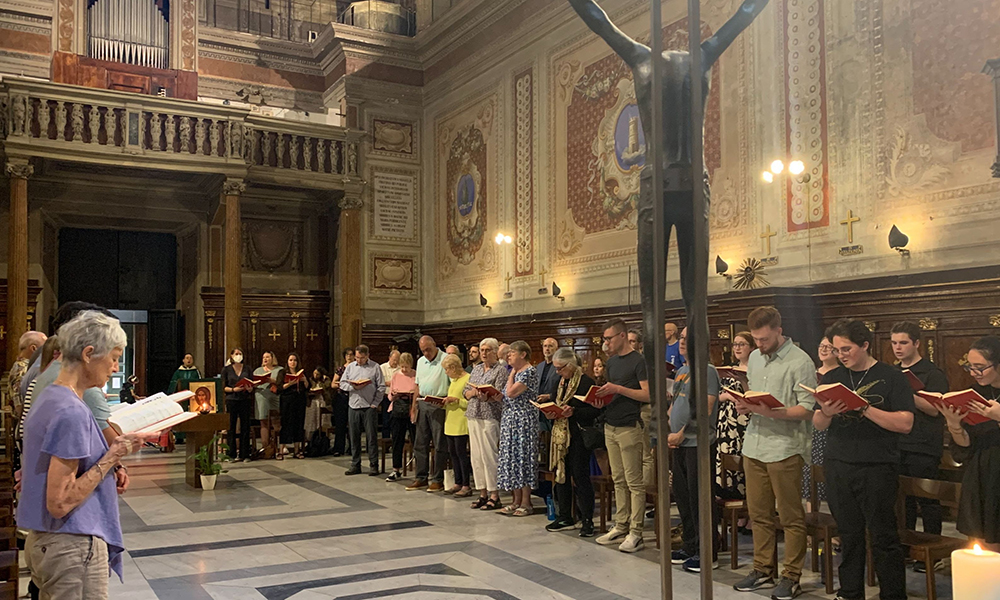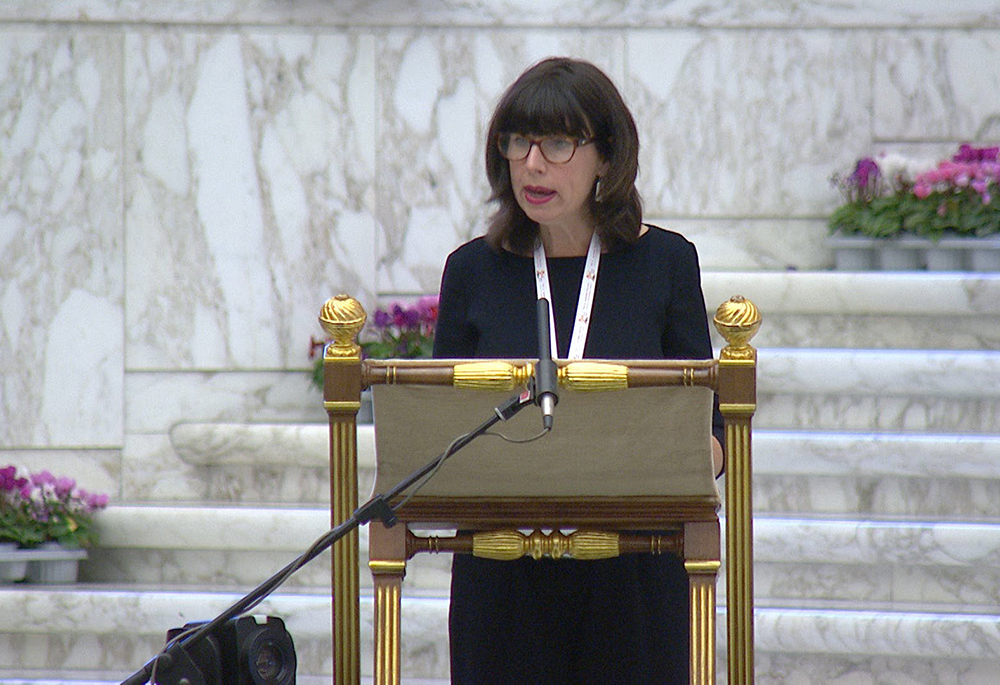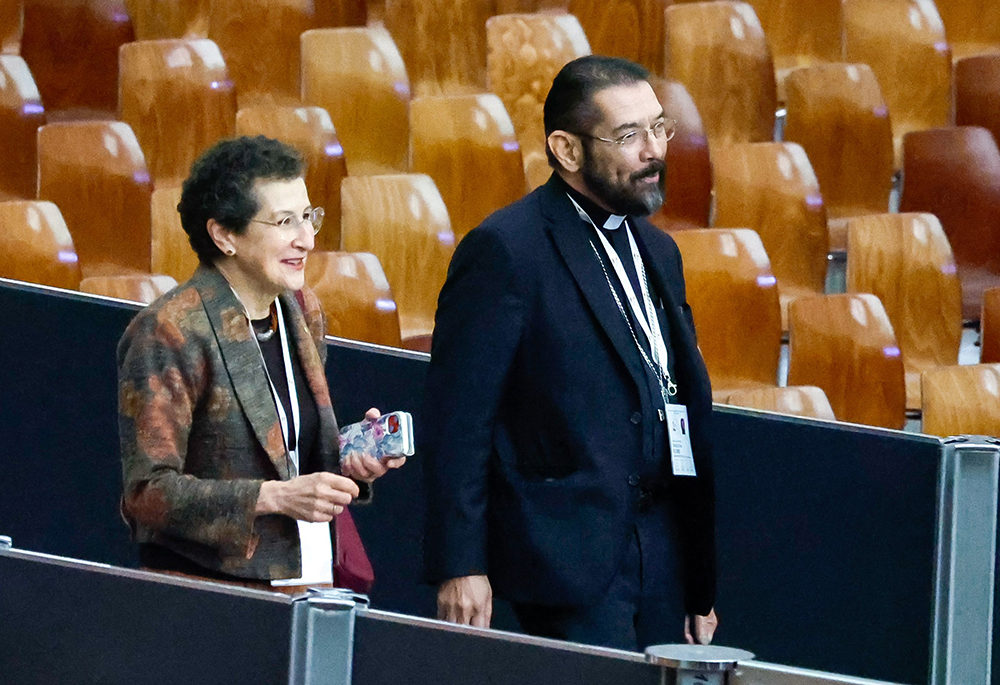
Members of Rome's Caravita community are shown here in an undated photo. (Courtesy of Caravita community)
Pope Francis' synod on synodality is officially in session Monday through Saturday, but on Sundays at 11 a.m. — if you're looking for an English-speaking delegate — there's a good chance you'll find them reunited at an informal synod meet-up on the other side of Rome's Tiber River.
It's about 1.5 miles — a roughly 30 minute walk — from the Vatican's synod hall to heart of the Eternal City's historic center where Rome's Caravita community has served as an unofficial parish for synod members from Australia, Great Britain, the United States and elsewhere over the past two Octobers.
Although it is not officially a parish, since 2000, Caravita has served as a liturgical community for English-speaking pilgrims who either live in or are visiting Rome. With an emphasis on ecumenism, interreligious dialogue and a high value placed on the role of the laity, Caravita has attracted the participation of many synod members who say they see the community as an example of the type of church the synod is trying to encourage.
"I think part of what Caravita does well is provide a warm welcome to people, greeting them at the door, a liturgy that feels like it feeds the life of a real, vibrant community of people," said British theologian and synod adviser Anna Rowlands.

Anna Rowlands, a professor of Catholic social thought and practice at Durham University in England, gives a theological reflection as the assembly of the Synod of Bishops begins work on its section, communion, in this screengrab from Oct. 9, 2023, in the Vatican's Paul VI Audience Hall. (CNS/YouTube/Vatican Media)
"For English-speaking synod members it provides a place of respite from the intensity of life around the Vatican, and a taste of the kind of liturgy we are talking about often in the synodal process: fine preaching, warmly welcoming, a place of friendship and hospitality," Rowlands observed.
Despite being steeped in tradition — the oratory where Caravita meets was completed in 1633 and Mozart once played on its organ — the community is decidedly forward-thinking.
Women acolytes are present at the altar, there are special partnerships with Rome's Anglican Centre and the Methodist Ecumenical Office to promote Christian unity and its mission statement emphasizes the community's "particular concern for those alienated from the church."
Advertisement
According to Fr. Anthony SooHoo, an American Jesuit who teaches at Rome's Pontifical Biblical Institute and helps lead the community, Caravita's reputation for its liturgy, combined with its emphasis on friendship and fellowship, is what makes it a welcome home for locals and visitors alike.
"Like St. Francis Xavier, we try to create a space where people from different cultures and parts of the world can enter into a dialogue and deepen their communion with one another as 'friends in the Lord,' " SooHoo told the National Catholic Reporter.
While one of the major innovations of the 2023 and 2024 synods has been the use of roundtables, where lay delegates sit side by side with cardinals and bishops, that sort of mode of being church isn't new for the Caravita community.
Susan Pascoe, an Australian synod expert who has been involved in the process since 2021, said that at every stage the synod "bonds of friendship have been formed and there is a sense that we are a temporary community of believers."
"Similarly, 'small Christian communities' emerge among people at the same tables in the assembly, among those from the same continent, among those with the same language and so on," Pascoe continued.

Susan Pascoe, a synod member from Australia, and Bishop Daniel Flores of Brownsville, Texas, arrive for a session of the assembly of the Synod of Bishops in the Vatican's Paul VI Audience Hall on Oct. 17, 2023. (CNS/Lola Gomez)
"For the English speakers, many of us have gravitated to Caravita to celebrate Sunday Eucharist together," said Pascoe. "It is a U-shaped configuration in the church which helps draw us together."
On one recent Sunday this October, the church was brimming with scores of students from Jesuit institutions who had arrived in town to better understand the synod. A week later, attendance was down to about 50 Massgoers, with many synod delegates opting to attend a canonization Mass at the Vatican.
For SooHoo, whether the church is at overflow capacity or scaled down in attendance, there is always an opportunity to share hospitality and build community, motivated by the "joy that is rooted in the hope of the Gospels."
"We are a microcosm of the situation that the church finds itself today — diminishing in some areas of the world but vibrant in others, living with the creative tension between tradition and mission-driven evangelization and adaptation, reckoning with the sins of the past and looking forward to a church renewed, balancing recognized authority with communal discernment," he said.
That communal discernment is present both in the pastoral council that governs Caravita, during its Sunday liturgies and also at the back of the church, where each week, Mass attendees are invited to continue the fellowship over a glass of prosecco.
And so it was on Oct. 20, the final Sunday before the synod's last week, where longtime Caravita regulars gathered with a mix of synod delegates. Together, during the prayers of the faithful, they offered up petitions for the success of the synod's labors. And soon thereafter, popped prosecco corks — both in celebration of their church community and to steel them for the work ahead.







